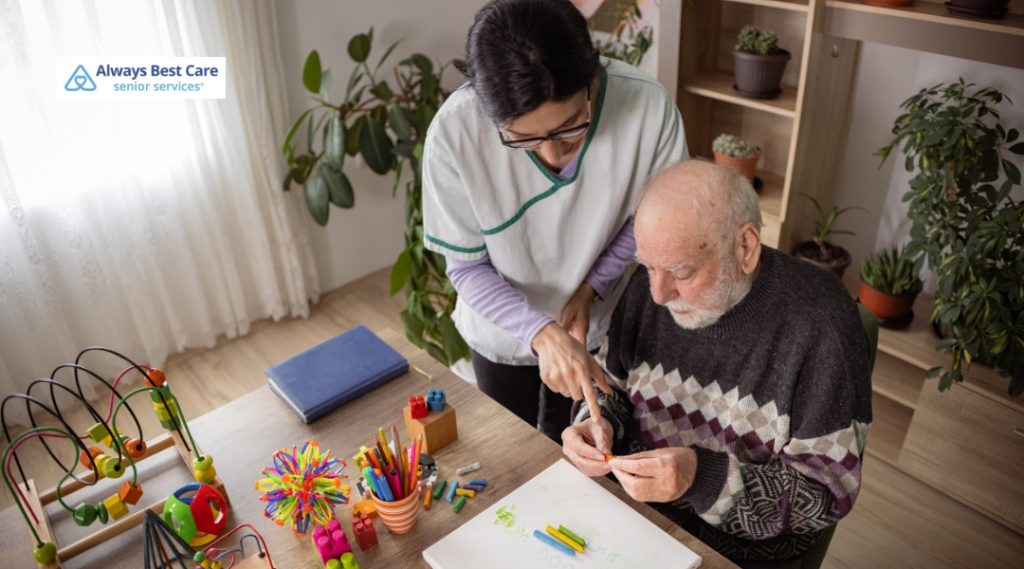Early Signs of Dementia You Shouldn’t Ignore in Argyle, TX

As our loved ones age, it’s natural to notice some changes in memory, thinking, and behavior.
Forgetting where you left your keys or mixing up a grandchild’s name might just be part of growing older.
But what if these slips signal something more serious?
It’s crucial to recognize the early signs of dementia to get help early and preserve your quality of life.
What you will learn:
- The key differences between normal age-related memory changes and the early signs of dementia.
- The most common early symptoms of dementia to watch for.
- The importance of early detection, when to seek help, and how in-home care can support seniors and families facing dementia.
Table of Contents
Normal Aging vs. Early Dementia
Understanding what’s normal for aging is key.
Age-related memory changes often involve forgetfulness that doesn’t disrupt daily life. A senior might take longer to recall a word or forget why they walked into a room, but the information usually comes back. They can still manage household tasks, keep appointments, and make sound decisions.
In contrast, dementia is a progressive condition that interferes with independence. It affects memory, communication, reasoning, and judgment, eventually requiring full-time care.
Identifying warning signs early can make a big difference in planning, treatment, and support.

7 Key Dementia Signs You Shouldn’t Ignore
Here are some telltale signs that shouldn’t be brushed off:
- Frequent Memory Loss That Disrupts Daily Life: Forgetting recently learned information and relying heavily on notes or others to remember things they used to manage on their own.
- Difficulty Completing Familiar Tasks: Struggling to follow a recipe, balance a checkbook, or operate appliances they’ve used for years can be a red flag.
- Trouble Finding Words or Following Conversations: Early dementia can make it hard to express thoughts or understand what others are saying.
- Poor Judgment or Decision-Making: Giving away large sums of money, neglecting hygiene, or dressing inappropriately for the weather are not typical of normal aging.
- Confusion About Time or Place: Getting lost in familiar places, forgetting how they got somewhere, or becoming confused about the date or season.
- Changes in Mood or Personality: Watch for unusual irritability, depression, anxiety, or withdrawal from social activities.
- Misplacing Items and Losing the Ability to Retrace Steps: Putting items in unusual places and being unable to find them again without help.
When to Seek Help for Early Signs of Dementia
If you’ve noticed one or more of these signs, it’s time to speak with a healthcare provider.
Getting a professional evaluation early on can lead to a more accurate diagnosis and better management.
Early detection allows for better planning, access to resources, and family involvement.

How In-Home Care Can Help
Caring for a loved one showing signs of dementia can be emotionally and physically challenging. That’s where in-home support can make a big difference.
Caregivers from Always Best Care of Argyle are trained to recognize early symptoms of cognitive decline and keep families informed about changes. They can help with daily tasks, encourage mental stimulation, and provide companionship.
Most importantly, having a compassionate caregiver in the home gives families peace of mind. It ensures your loved one is safe, supported, and able to maintain as much independence as possible.
FAQ
Q: What is the difference between normal aging and early dementia?
A: Normal aging involves forgetfulness that doesn’t disrupt daily life, while dementia is a progressive condition affecting memory, communication, reasoning, and judgment, impacting independence.
Q: How can in-home care help?
A: In-home care provides daily assistance, mental stimulation, and companionship, ensuring safety and independence for your loved one.
Q: Why is early detection important?
A: Early detection allows for better planning, access to resources, and family involvement, leading to more effective management.

Spot the Signs Early | Protect Your Loved One’s Future!
If you’re concerned about memory changes in someone you care about, don’t wait to take action. Contact Always Best Care of Argyle at (940) 241-2273 for a care consultation. Our experienced team can help you understand your options and create a care plan tailored to your loved one’s unique needs. Early support matters—and you don’t have to navigate it alone.





